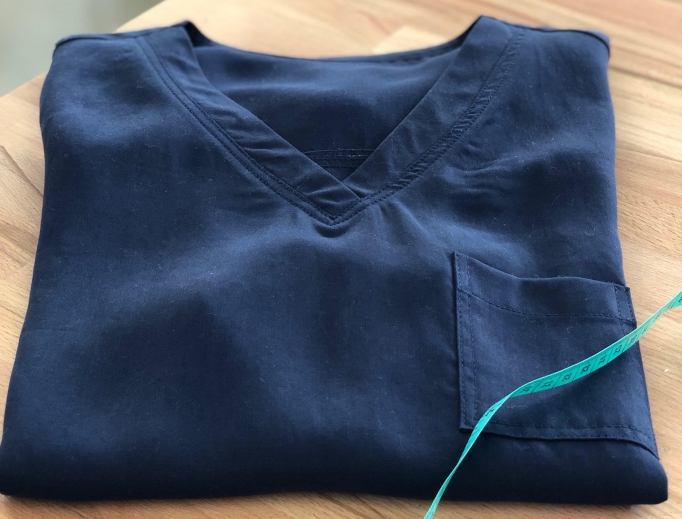Of Fashion and Faith: Catholic Women Bring Ethical, Modest Choices to Industry
Upholding the Dignity of Consumers and Workers

“What we choose to wear communicates who we are and who we want to be,” Janet Easter, co-founder of Verily magazine and current thrift curator for Ever Thrift, told the Register. “It allows us to communicate our dignity without saying a word, and that is truly beautiful.”
Some Catholic women are highlighting both modesty and ethical practices in fashion design today, standing in refreshing contrast to modern fashion trends, which are often an affront to the dignity of women and workers.
Upholding the Dignity of Consumers and Workers
Sisters Audrey Cole and Mary Kunkel, co-founders of Paris Bloom, inherited their love for fashion from their great-grandmother, who designed all of her own clothes and loved only a few things more than fashion, including her faith.
Cole and Kunkel’s parents reiterated the treasure of their faith throughout the girls’ upbringing and home schooling. “They taught us the importance of developing your God-given talents so you can use them to engage with and transform the world,” Cole said. After years of shopping and experiencing the struggle of finding modest, stylish fashion choices, the sisters launched their own brand of classic dresses for women. “Starting Paris Bloom is a way for us to help restore truth and goodness to the fashion industry and to evangelize the world through beauty,” explained Cole.
As they navigated the fashion industry, the sisters quickly realized their need to not only uphold the dignity of women, who, according to Cole, are often exploited by the mass media, major fashion houses and apparel retailers who offer choices that reveal a woman’s body in ways that are sexualized and uncomfortable to her — but also the dignity of workers and all involved in the production and consumer process.
“When we began researching the fashion industry, we were horrified to learn that behind all the glitzy photo shoots and low prices, there is an ugly reality,” noted Cole. “Much of our imported clothing is made in third-world countries by laborers who are paid cents by the hour.” Cole also reported the significant pollution and waste generated by the “fast fashion” industry.
In response to these problems, Paris Bloom’s dresses are made in the United States, where Cole and Kunkel can ensure safe working conditions and fair wages, support the local economy and produce dresses made from high-quality fabrics with natural fibers for long-lasting wear.
Their faith and their drive to uphold the dignity of both consumers and workers fuel Cole and Kunkel in their work. “What Paris Bloom dresses reveal about womanhood is much more inspiring than what is accomplished by sexualized clothing, [and] our customers are happy to purchase products they know are made by sewers paid just wages in a good working environment. Now that we know we can make a difference, we’re not going to give it up.”
Ethical Wear for Niche Markets
But Cole and Kunkel aren’t the only Catholic women desiring to bring ethical fashion to the marketplace. Claire Couche, founder of Moscati Scrubs, a company inspired by the life and miracles of St. Giuseppe Moscati, combined her love of the faith, the medical field and ethical fashion to bring ethically made medical scrubs to the marketplace.
After learning about the toll the fast fashion industry takes on people and the planet through the documentary The True Cost, Couche wanted to do something about it. “I realized for the first time that there is a life, in fact many lives, behind the clothes I purchase and wear,” she recalled.
After watching another movie, this one about St. Giuseppe Moscati, Couche, a registered nurse before becoming a stay-at-home mother, felt as though the Holy Spirit pressed it upon her heart to start the ethically made medical scrubs company in his honor. “Moscati said, ‘Charity will transform the world,’ and I firmly believe it will,” Couche emphasized. “My goal is to encourage charity to be lived out in Moscati Scrubs: from fabric sourcing, to the workers making the scrubs, to the medical professionals wearing the scrubs, to the patients being served.” As she prepares to launch a Kickstarter campaign for Moscati Scrubs, Couche recommends those interested in supporting the effort visit MoscatiScrubs.com to sign up for their email list.

Couche believes every small effort to shop ethically and sustainably makes a difference. “Begin researching fast fashion and the affects it has on people and our planet,” Couche recommends. “Ask your favorite brands to be transparent about their supply chain and how their workers are treated and what conditions they work in. Find and support ethical companies, secondhand stores, or have a clothing exchange with your friends. Ask yourself questions before making a purchase. There are creative ways to shop ethically and sustainably.”
Modesty and Fashion: Not Mutually Exclusive
Janet Easter’s lifelong love of fashion and her reversion in faith as a young adult led her to cofound an alternative women’s lifestyle publication called Verily magazine, which aims to help women become the best version of themselves. “My mind was blown by what the Church actually taught about the dignity of women, the feminine genius, and even the beautiful virtue of modesty and what it actually meant,” Easter recounted. She passionately teaches others about the value of modest fashion, not as simply a way to “help men,” but, as Pope St. John Paul II wrote in Love and Responsibility, “because it is good for the woman herself.”
In keeping with Verily’s mission to “show, not tell,” Easter believes the best way to communicate modesty is to live it. “We need to reclaim what beauty really means. To objectify simply means to take a part away from the whole. When clothes objectify us, they tend to put the focus on just a part of us, or literally a body part, to the point of distraction. To be beautiful is to be whole,” said Easter.
Easter continues to pursue her passion in wearing and sharing modest fashion through ShopEverThrift.com, where she curates, styles and resells thrifted and vintage clothes online. “I love thrifting for the sheer joy of finding fun, one-of-a-kind pieces, but also for the fact that it’s making use of what we have and wasting less,” shared Easter. “What you wear on the outside can affect you on the inside.”
Katie Warner writes from Georgia.
Her website is KatieWarner.com.
- Keywords:
- fashion
- katie warner
- modesty

















